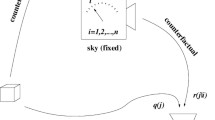Abstract
In standard quantum mechanics (QM), a state vector \(| \psi \rangle \) may belong to infinitely many different orthogonal bases, as soon as the dimension N of the Hilbert space is at least three. On the other hand, a complete physical observable A (with no degeneracy left) is associated with a N-dimensional orthogonal basis of eigenvectors. In an idealized case, measuring A again and again will give repeatedly the same result, with the same eigenvalue. Let us call this repeatable result a modality \(\mu \), and the corresponding eigenstate \(| \psi \rangle \). A question is then: does \(| \psi \rangle \) give a complete description of \(\mu \) ? The answer is obviously no, since \(| \psi \rangle \) does not specify the full observable A that allowed us to obtain \(\mu \); hence the physical description given by \(| \psi \rangle \) is incomplete, as claimed by Einstein, Podolsky and Rosen in their famous article in 1935. Here we want to spell out this provocative statement, and in particular to answer the questions: if \(| \psi \rangle \) is an incomplete description of \(\mu \), what does it describe ? is it possible to obtain a complete description, maybe algebraic? Our conclusion is that the incompleteness of standard QM is due to its attempt to describe systems without contexts, whereas both are always required, even if they can be separated outside the measurement periods.
Similar content being viewed by others
Notes
In QM the assignment of values to measurement results is contextual (Kochen-Specker theorem), whereas the assignment of probabilities to measurement results is non-contextual (Gleason theorem, see also [7]). This creates endless confusions in the terminology, and extracontextuality is a good way out of them. For projectors eigenvalues 0 and 1 are contextual, whereas average values (probabilities) are non-contextual; this is another way to tell that there is no dispersion-free state
In [14] an incomplete direct product (i.e. a a sector in modern terminology) is defined as an equivalence class between vectors belonging to the infinite direct product. This idea can be extended in the algebraic framework, and an essential feature is that the asymptotic information about the sector can be encoded in a concise way, without specifying the full algebra (see e.g. Chi-Keung Ng, “On genuine infinite algebraic tensor products”, http://arxiv.org/abs/arXiv:1112.3128)
References
Grangier, P.: Contextual objectivity: a realistic interpretation of quantum mechanics. Eur. J. Phys. 23(3), 331 (2002)
Auffèves, A., Grangier, P.: Contexts, systems and modalities: a new ontology for quantum mechanics. Found. Phys. 46, 121 (2016)
Auffèves, A., Grangier, P.: Violation of Bell’s inequalities in a quantum realistic framework. Int. J. Quantum Inform. 14, 1640002 (2016)
Auffèves, A., Grangier, P.: Recovering the quantum formalism from physically realist axioms. Sci. Rep. 7, 43365 (2017)
Auffèves, A., Grangier, P.: Extracontextuality and extravalence in quantum mechanics. Philos. Trans. R. Soc. A 376, 20170311 (2018)
Auffèves, A., Grangier, P.: A generic model for quantum measurements. Entropy 21, 904 (2019)
Auffèves, A., Grangier, P.: Deriving Born’s rule from an inference to the best explanation. Found. Phys. 50, 1781–1793 (2020). https://doi.org/10.1007/s10701-020-00326-8
Grangier, P.: Completing the quantum formalism: why and how ? arXiv:2003.03121v2
Einstein, A., Podolsky, B., Rosen, N.: Can quantum-mechanical description of physical reality be considered complete? Phys. Rev. 47, 777 (1935)
Bohr, N.: Can quantum-mechanical description of physical reality be considered complete? Phys. Rev. 48, 696 (1935)
Bell, J.S.: On the Einstein–Podolski–Rosen paradox. Physics 1, 195 (1964)
Aspect, A.: Closing the door on Einstein and Bohr’s quantum debate. Physics 8, 123 (2015)
Laloë, F.: Do We Really Understand Quantum Mechanics?. Cambridge University Press, Cambridge (2012)
von Neumann, J.: On infinite direct products. Compositio Mathematica 6, 1–77 (1939)
Emch, G.G.: Algebraic Methods in Statistical Mechanics and Quantum Field Theory. Dover, New York, 2000 (reprint of the Wiley-Interscience 1972 edition)
Fewster, C.J., Rejzner, K.: Algebraic Quantum Field Theory - an introduction. arXiv:1904.04051
Lledó, F.: Operator algebras: an informal overview. arXiv:0901.0232
Buchholz, D., Fredenhagen, K.: A \(C^*\)-algebraic approach to interacting quantum field theories. Commun. Math. Phy. 377, 947–969 (2020) [arXiv:1902.06062]
Allahverdyana, A.E., Balian, R., Nieuwenhuizen, T.M.: Understanding quantum measurement from the solution of dynamical models. Phys. Rep. 525(1), 1–166 (2013)
Baez, J.: Bell’s inequalities for \(\text{ C}^*\)-Algebras. Lett. Math. Phys. 13, 135–136 (1987)
Acknowledgements
The author thanks Alexia Auffèves, Nayla Farouki, Franck Laloë and Roger Balian for many useful discussions.
Author information
Authors and Affiliations
Corresponding author
Ethics declarations
Conflict of interest
The author did not receive any specific support for the submitted work, he has no relevant financial or non-financial interest to disclose, and no conflict of interest whatsoever relevant to the content of this article.
Additional information
Publisher's Note
Springer Nature remains neutral with regard to jurisdictional claims in published maps and institutional affiliations.
Rights and permissions
About this article
Cite this article
Grangier, P. Completing the Quantum Formalism in a Contextually Objective Framework. Found Phys 51, 76 (2021). https://doi.org/10.1007/s10701-021-00424-1
Received:
Accepted:
Published:
DOI: https://doi.org/10.1007/s10701-021-00424-1




